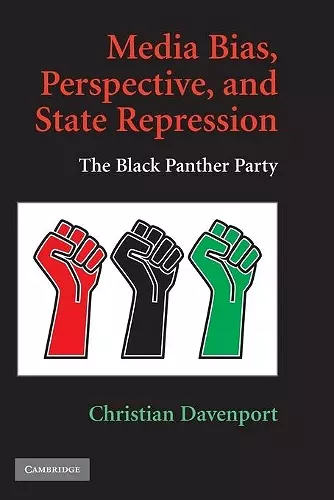Media Bias, Perspective, and State Repression
The Black Panther Party
Format:Paperback
Publisher:Cambridge University Press
Published:23rd Nov '09
Currently unavailable, and unfortunately no date known when it will be back
This paperback is available in another edition too:
- Hardback£75.00(9780521766005)

This book examines the information reported by the media regarding the interaction between the Black Panther Party and government agents in the Bay Area of California (1967–1973).
Examines information reported by the media regarding the interaction between the Black Panther Party and government agents in the Bay Area of California (1967–1973). Davenport argues that the geography and political orientation of the newspaper influences how specific details are reported and examines the methodological implications of this.This book examines information reported within the media regarding the interaction between the Black Panther Party and government agents in the Bay Area of California (1967–1973). Christian Davenport argues that the geographic locale and political orientation of the newspaper influences how specific details are reported, including who starts and ends the conflict, who the Black Panthers target (government or non-government actors), and which part of the government responds (the police or court). Specifically, proximate and government-oriented sources provide one assessment of events, whereas proximate and dissident-oriented sources have another; both converge on specific aspects of the conflict. The methodological implications of the study are clear; Davenport's findings prove that in order to understand contentious events, it is crucial to understand who collects or distributes the information in order to comprehend who reportedly does what to whom as well as why.
'Scholars with an interest in social movements, repression, and/or the Black Panthers have been eagerly awaiting this book for the better part of a decade. It was worth the wait. The methodological implications of the work – as encoded in Davenport's already well known Rashomon Effect – are reason enough to already regard the book as a classic. In addition, however, the work also represents a thoughtful, systematic study of the Black Panthers. Anyone who knows this troubled corner of the literature is sure to appreciate what a rare and welcome achievement this is.' Doug McAdam, Stanford University
'This is an important book with an important argument. It shows that different news sources not only covered different events relevant to the Black Panther Party, but constructed different narratives about cause-effect relations between movement actions and state repression. The sequences of mainstream news stories showed state repression to be a response to a few high-profile Black Panther actions and showed state repression effectively crushing the Black Panther Party. The sequences of news stories in the movement news sources showed state repression to be a response to a much wider and more diffuse array Black Panther protest actions and showed Black Panther dissent continuing in the face of ongoing repression. Which theories of state repression got confirmed or rejected depended on which news sources you used. Christian Davenport provides the necessary context for this crucial analysis with informative and well-written summaries of research and theory on news coverage, state repression, and the history of the Black Panther Party and race relations in the Bay Area. The result is a book of crucial importance for scholars of social movements, state repression, mass media, and the history of the Black movement in the US.' Pamela Oliver, University of Wisconsin
'This book explores the research implications of what Davenport terms 'the rashomon effect'. Davenport's careful analysis of multiple (and sometimes contradictory) newspaper accounts of contentious interactions between the Black Panther Party and authorities in California's Bay Area yields a number of new and fascinating findings on the dynamics of protest, violence, and repression. In sum, this book makes a compelling argument for using varied sources of data on events as a method for understanding the process of collective action as experienced by different audiences.' Susan Olzak, Stanford University
'This meticulously researched, well-written and broadly integrative book is simultaneously about a chief methodology used by scholars of contentious politics, and state repression of the Black Panther Party in the Bay Area during the late 1960's. On the methodological level, the book illustrates the pitfalls of relying on single news source accounts of conflict and repression and it clearly delineates the sources of bias related to such news accounts. As such, the book stands out as a new and exciting addition to the growing literature on media bias and will become a classic text on this subject. On a substantive level, Davenport describes important events and details related to the state repression of a hitherto understudied social movement. Indeed, this work contributes to a much deeper and nuanced understanding of this movement during this period of time. Media Bias, Perspective and State Repression should be read and digested by political scientists, sociologists, historians, communications scholars and laypeople alike.' Sarah Soule, Stanford University
ISBN: 9780521759700
Dimensions: 228mm x 154mm x 14mm
Weight: 360g
260 pages